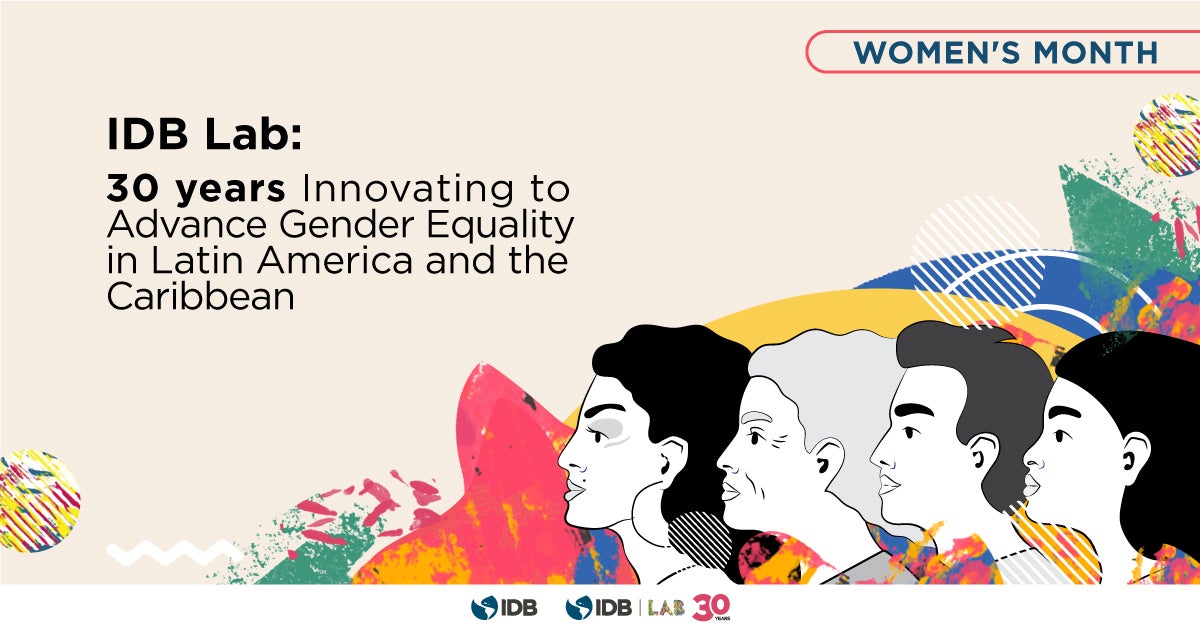The news of the day typically brings examples of how we continue to treat men, women, and those who identify as non-binary differently. These serve as constant reminders of the pervasive challenges we face as societies in our pursuit of gender equality. The IDB’s latest sector publication, the Gender and Diversity Sector Framework, quantifies the sizeable gender gaps that the region faces today. The gaps are large, spanning all aspects of life—economic, social, civic, and political. In some instances, such as the wage gap, the most recent data even suggests that it has worsened over the past decade.
There is still a long way to go to achieve gender equity, which is why it represents one of the IDB Group’s strategic priorities. The efforts of IDB Lab – the IDB Group’s innovation lab – also reflect these goals in its daily work. That is why on its 30th anniversary, we recognize some of its achievements as a relevant partner committed to the region’s gender agenda.
Providing Equal Opportunity in Digital Skills
Latin America and the Caribbean (LAC) have seen impressive progress in narrowing the gender gaps in education and skills and, more recently, in digital skills and STEM (Science, Technology, Engineering, and Mathematics). IDB Lab has contributed to this result, supporting digital skills development through coding boot camps and similar programs. These vehicles represent an impactful channel to develop human capital, which benefits participants and employers alike, according to a 2019 IDB study. For instance, the partnership with the NGO Laboratoria helped over 2,800 women develop coding skills, which have contributed to improved labor market outcomes and have served as a model for other companies and NGOs, according to an evaluation by MIT’s D-Lab.
Other examples of IDB Lab-supported private sector efforts to address digital skills gaps in women include Valentina’s Program in Guatemala and the Reprograma program in Brazil. In addition to narrowing skills gaps, in both cases, the programs specifically targeted vulnerable populations or those with limited access to opportunities. In the case of Brazil, for instance, the program focuses on LGBTQ+ people.
Providing Equal Access to Finance for Entrepreneurs
Access to finance for women entrepreneurs has advanced significantly over the past decade. One of the first important efforts was the partnership with the region’s banks. Through the Women Economic Banking (weB) initiative, IDB Lab, in partnership with UN Women and IDB Invest, financed the development of products and services for women entrepreneurs across different financial institutions.
The program was eventually implemented, with technical cooperation funds, across 20 financial institutions from 2012 to 2018. In two of these cases, the seed funding led to additional financing by IDB Invest, including financing for women entrepreneurs with Itaú-Unibanco, in Brazil, and a gender bond with Banistmo, in Panama. The program is credited with helping to accelerate the expansion of financing for women entrepreneurs in LAC.
IDB Lab also partnered with other global leaders promoting female entrepreneurship, such as Goldman Sachs’ 10,000 Women Program, in Peru, providing coaching, mentoring, and valuable connections for women entrepreneurs.
Providing Leadership and Entrepreneurship Opportunities
The last two decades have also seen an increase in entrepreneurial activity among women in Latin America and the Caribbean. For instance, data from the Global Entrepreneurship Monitor shows that between 2010 and 2022, there was 8% more total entrepreneurship activity. In addition, the percentage of women founding or leading early-stage companies has also grown significantly. IDB Lab has contributed to these results through investments in company accelerators, and incubators, and through the development of the WeXchange Platform. The platform provides a forum where women entrepreneurs in the tech industry can connect with role models, investors, and potential funders.
WeXchange is now in its 11th edition and has helped over 2,700 women entrepreneurs in the STEM field accelerate their businesses, establish valuable business relationships, and access venture and other funding for their startups. These upstream investments are critical in addressing gender gaps in leadership, which are among the most salient gaps today, according to a recent study by the World Economic Forum.
Promoting an Intersectional Approach to Gender
This review of IDB Lab’s contribution to gender would not be complete without recognizing that the gender equality agenda is today increasingly linked to other development priorities, such as climate and diversity. This is the case of one of the first adaptation projects in the region, the dry corridor adaptation project in Guatemala. The project, implemented together with the Mancomunidad Copán Chortí, addressed food security and vulnerability to climate change, while having a significant impact on gender at the same time. Data from an IDB Lab impact evaluation shows that it addressed one of Guatemala’s most significant health challenges: the high malnutrition rates among girls. The project has also disproportionally benefitted the indigenous populations of the dry corridor. This dimension of intersectionality is critical for projects across all the new development agendas IDB Lab is working on, including climate and bioeconomy, the aging economy, as well as the development of digital solutions in artificial intelligence (AI) and blockchain.
As IDB Lab prepares for the next thirty years, we can take heart at Latin America and the Caribbean’s progress over the past thirty. Innovation has played a central role in narrowing and, in some cases, eliminating gender gaps. This should serve as a motivation to embrace the gender agenda moving forward, with the confidence that no gender challenge is too large to tackle.


Leave a Reply